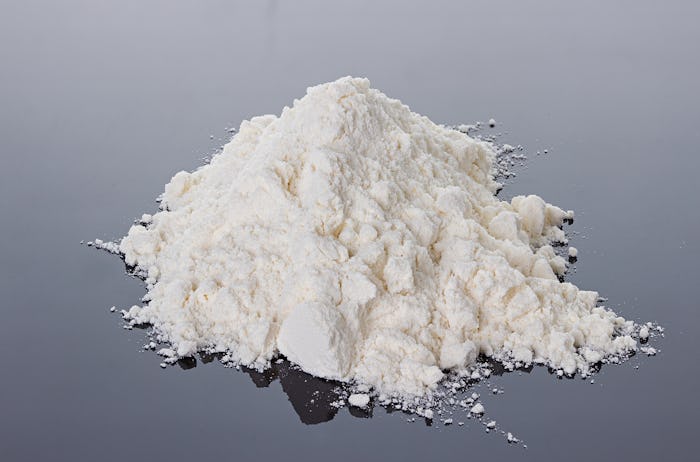Partying with cocaine may seem exciting to some, but there are numerous reasons why you should stay away from the addictive drug, especially if having children of your own is part of your life plan. If you’re hoping to get pregnant, or if you are having unprotected sex, using this particular drug could be destructive beyond. Here's what you need to know about how cocaine affects fertility, and not just yours.
Not only will cocaine use affect a woman’s fertility, but it will affect a man's reproductive system too. “Cocaine use in both men and women can adversely affect reproductive function and the ability to get pregnant by interfering with reproductive hormones as well as long term and often permanent damage to both male and female reproductive organs,” explains Alex Polyakov, M.D., OB-GYN at the Royal Women’s Hospital. If you want even stronger reasons for both of you not to do cocaine while you are planning a family or if you aren't careful about birth control, Dr. Polyakov says there are serious consequences to the fetus, including increased the risk of miscarriage, birth defects, and pregnancy complications.
Let's focus here on fertility — the process of getting pregnant — and how much harder it is if you are using cocaine. According to Edward Marut, M.D., board-certified reproductive endocrinologist with Fertility Centers of Illinois, cocaine can cause tubal damage, a leading cause of infertility in women. “Patent Fallopian tubes are necessary for conception and blockage results in absolute infertility,” explains Dr. Polyakov.
Coke can have a very pronounced effect on the male reproductive system as well. “Cocaine is a central nervous system stimulant, yet is also a local anesthetic. It will have effects on hormone production in the brain, which can have adverse effects on both male and female reproduction in terms of semen quality and ovulation,” explains Dr. Marut. Men who use cocaine produce lower testosterone and have lower sperm count, according to a 2019 study in the Journal of Clinical Medicine. And if a male has been using for a while, long-term cocaine use can result in permanent damage to the cells that produce sperm, notes Harvard Health Publishing. “A semen analysis includes looking at the number of sperm, movement or motility, as well as what proportion of sperm looks normal,” explains Dr. Polyakov. “All these parameters need to be within the normal range for a good chance of achieving spontaneous pregnancy. Cocaine use, especially for an extended period of time, adversely affects all these measurements.”
Not only is the sperm affected from cocaine use, but so it’s a male’s ability to perform during intimacy. Men who are using may find it difficult to get erect. That’s because the drug restricts testicular blood flow, causing erectile dysfunction, per to Drugs.com.
While there are some substances out there that the medical community may not be 100% sure of how it affects fertility, the message is very clear when it comes to cocaine. It affects both males and females in a bad way. Most importantly, if you still are able to successfully conceive, it can seriously affect your baby and pregnancy in scary ways, potentially causing miscarriage, fetal anomalies, prematurity, neonatal seizures, and death, warns Dr. Marut.
Cocaine highs may be fun while they last, but the ongoing issues that they cause to the reproductive process are not worth it. And because the drug is highly addictive, it's definitely not a habit you should adopt, especially if you're planning on having a baby.
In 2012, over 600,000 people tried cocaine for the first time. In the same year, over 658,000 people sought help for cocaine addiction, notes Addiction Center, further proving how easy it is to get hooked, no matter your intent. Cocaine use releases dopamine in the user's brain. It feels good — temporarily. Given that, using it occasionally leads to wanting to use it more and more. This is horrible for anyone, but especially for someone who is considering expanding their family as we've seen that it not only reduces your chances of getting pregnant and staying pregnant, but also of having a healthy baby. On top of that, the drug can be life-threatening. “The medical complications of cocaine use are also devastating — hypertension, stroke, liver disease, kidney disease, cardiac arrest, and more,” says Marut. “So if you are planning to conceive and using, halt all drug use.”
If you or someone you know is seeking help for substance use, call the SAMHSA National Helpline at 1-800-662-HELP(4357).
Studies referenced:
Duca, Y., et al. (2019) Substance Abuse and Male Hypogonadism. Journal of Clinical Medicine, https://www.ncbi.nlm.nih.gov/pmc/articles/PMC6571549/
Experts:
Alex Polyakov, M.D., obstetrician-gynecologist at the Royal Women’s Hospital
Edward Marut, M.D., board-certified reproductive endocrinologist with Fertility Centers of Illinois
This article was originally published on
